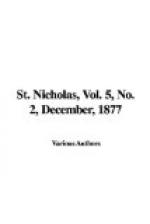From that time on, when the name of a thing was made plain to him, he seemed to grasp it immediately and never forgot it. This expedited matters wonderfully, for I liked to talk to him and observe his efforts to repeat what I said, so there was ample conversation, though somewhat one-sided, going on in our ancient dwelling. I marveled at the parrot’s extraordinary power; but what astonished me above all was his wonderful memory, and his unlimited capacity for taking in new ideas. Sometimes I would ask him, after an interval of weeks, some name of a thing I had taught him, and the answer was invariably correct. On such occasions I would say to him:
“Pippity, what’s that?”
He would tell me immediately; and I laughed outright when, one day, as we were strolling through the forest, I stumbled over a stone, and the parrot, perching on it, pecked it with his bill, and then, looking up at me askance, asked:
“What’s that?”
That was a phrase I had unwittingly taught him. And now I began more than ever to perceive his extraordinary genius.
Thenceforth it was “What’s that?” and “What’s that?” and actually the fellow wanted to learn more quickly than I could teach.
Once, after this intelligent bird had been with me for some months, we were sitting quietly in our domicile, shaded from the afternoon sun by our lofty rock-built palace, enjoying the beauties of creation, when all at once he broke out in his clear, melodious voice:
“Tell me something new!”
I looked at him in amazement. I had never taught him to say that; but undoubtedly he must have heard me say, at some time or other, “Pippity, now I will tell you something new.” Yet how the bird had managed to turn the phrase grammatically to himself puzzled me not a little.
However, I soon began to teach him something else that was new, for I had been thinking that it was time that he should learn the names of the plants,—at least of the most interesting and useful. So it was not long before Pippity had a fair acquaintance with botany.
Nearly a year had now rolled round, when one day Pippity was missing. What could have happened to him? Had he grown tired of my society? Did he begin to think that, after all, savage freedom was to be preferred to dull, systematic civilization? Had he come to the conclusion that much learning is, at best, but vanity? Did he want to go babbling again in chaotic gibberish rather than to talk smoothly by rote?
Two days passed, in which to drive away any natural feeling of loneliness at the parrot’s absence, I set down notes as concisely as possible of what had occurred to me so far. For this purpose I used the point of my knife and thin slabs of mica, wishing to save the small stock of memorandum paper in my note-book and journals as much as I could. At other times I had used bark and similar things to write on, but the mica was more durable, and more easily stowed away. It was my intention to make a still more condensed series of notes on the paper I had by me, whenever I should feel like undertaking the task. The juice of berries would serve for ink, and a feather or light reed would make as good a pen as I should want. This plan I carried out afterward.




